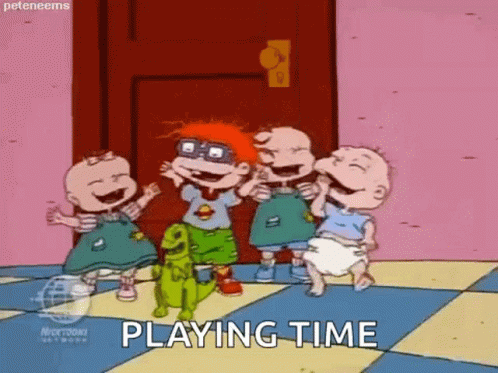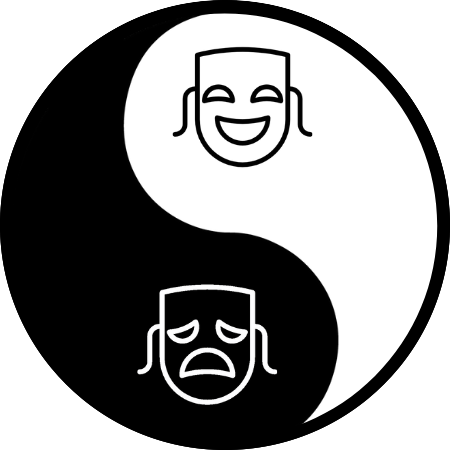Play is Life
"We don't stop playing because we grow old; we grow old because we stop playing." ~ George Bernard Shaw
If any slice of the population appreciated the true value of play, one would assume it'd be actors. After all, once we've done the prep work, play becomes our primary function.
Yet, it seems remarkably common for us actors to leave the spirit of play on stage or in front of the camera. When the lights go out, so does our childlike spark. Our imaginative thinking cap gets replaced by our serious beret.
Regular Dojo homies will know that two quests underlie everything we do here: peak performance and holistic well-being. We mine the science in these arenas to distil and alchemise that which could make both the reality for us as actors (heaven forbid!).
Often, these two threads suggest distinct — though interrelated — frameworks or strategies (e.g., routines for peak performance, nutrition for holistic well-being). But here's a fun finding: research shows that play can directly enhance both.
👉🏼 Monthly subscription
👉🏼 Yearly subscription (17% discount)
Play 101
But what is "play" outside the context of our craft?
Play is characterised by its lack of external purpose. It's an experience that celebrates its own existence, not the attainment of a future outcome.
This can be a tough sell to goal-orientated, type-A folk (hi, friends 👋🏼). I long neglected play because I couldn't see the "point". Which, paradoxically, is the point. Play doesn't need a reason.
However, the definition that most motivated my 180 came from a talk by Dr Stuart Brown: "The opposite of play is not work, it's depression".[1] That one landed.
Continuing in the vein of well-being, play can also decrease blood pressure,[2] temporarily alleviate pain, and flood our body with hormones that turn the volume down on stress while pumping up the feel-goods.[3]
On the peak performance side, play can cultivate optimism,[4] improve our social skills, and boost our learning capacity.[5] If play were a pill, everyone would be popping it.
The Way of Play
Until such a pill is produced, we'll have to embrace ye olde fashioned approach. Fortunately for us, doing so has only two steps.
First: schedule it. If it ain't on your calendar, it ain't in your life.
"Scheduling" playtime like this may sound artificial, and, to an extent, it is. But there's a reason we had recess at 10:30 every school day — we actually crave structure. Our creativity does too.
Make some decisions upfront about your play space and play people to counter decision fatigue on the day. As play is inherently unstructured, this will look more like a loose sketch than a minute-by-minute military operation. For example:
- Park, 18:00, with doggo.
- Spray painting class, 10:00, with best friend.
Second: show up. Show up and be present. This means no snapping photos for the 'gram, or drafting witty tweets in our head. Allow play to be for our own approval.

When I started making this a personal practice last year, I found it helpful to collect a list of "Joy Drops" — activities I found provided a reliable dose when I lacked the mental bandwidth to reinvent the wheel and try something new. Listening to music (with good headphones), playing board games, and participating in team sports seem to be my main go-tos. And climbing trees. Grown humans climbing trees incurs a whole bunch of raised eyebrows, but dang... It's worth it.
Others cite babysitting their nieces/nephews, karaoke parties with friends, and aimless solo bike rides as their favourite flavour. Inspiration can also be taken from your play pursuits of choice as a child. Don't let anyone tell you LEGO or Play-Doh have an upper age limit.
Ultimately, the activity itself is relatively unimportant, so don't get too hung up on finding "the one". Stay open to the unfamiliar and unexpected. It's the commitment to and attitude toward the experience that counts.
You wouldn't be reading this if you weren't an ambitious ass amigo. But keep in mind that the formula for success isn't just "Work, work, work, work, work" (no offence Rihanna, we love you). It's equal parts "Play, play, play, play, play".
Thoughts / feedback / challenges? We'd genuinely love to hear.
Need some 1-On-1 attention? Book your coaching session today.
Citations:
[1] https://www.ted.com/talks/stuart_brown_play_is_more_than_just_fun/transcript?language=en
[2] https://bigthink.com/smart-skills/play-imperative-for-adults/
[4] https://www.nifplay.org/play-for-you/make-play-part-of-an-adult-life/
